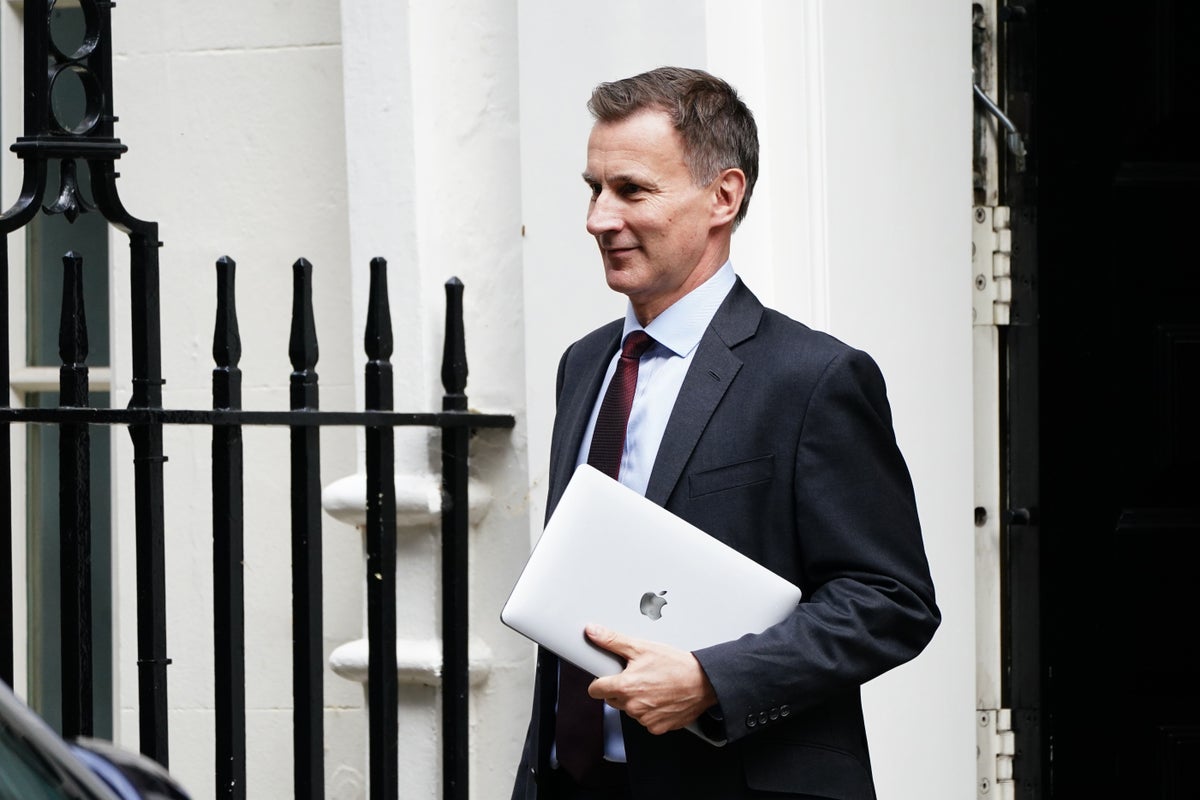
Chancellor Jeremy Hunt has argued that sizeable tax cuts this year would “compromise” the battle against inflation as colleagues piled on the pressure for a pre-election giveaway.
The Cabinet minister did however leave open the possibility of carrying out tax cuts in 2024, meaning Rishi Sunak may be able to make a vote-enticing pitch ahead of going to the polls.
Pressure within the party for Mr Hunt to act was made clear as former prime minister Liz Truss drew a large crowd as she called for tax cuts.
Ms Truss showed she was still popular with the members who elected her a little over a year ago as she called for corporation tax to be cut to 19% or less and for Government spending to be slashed.
Cabinet minister Michael Gove has also publicly called for pre-election tax cuts.
Mr Gove also backed Business Secretary Kemi Badenoch calling for the UK to keep the threat to leave the European Convention on Human Rights (ECHR) “on the table” in a suggestion popular with the Tory right.
Some observers believe there is an unofficial “beauty pageant” going on just in case there is a chance to run for the leadership in the event of Tory failure at the next election.
Mr Hunt, however, told GB News: “The way you win elections is by making promises people believe.
“We’re being honest with people, there is no short cut to tax cuts.
“If I gave a big tax cut this year, it would be inflationary, because we’d be putting money in people’s pockets, which would boost up demand, which would ultimately mean prices would go up as well. So this is not the right time.”
He ruled out any “substantial” tax cuts, including to inheritance tax, or the levies on work Mr Gove said he favoured reducing.
The Chancellor said: “I don’t think it’s going to be possible to do any big tax cuts, on the basis first of all of the public finances as we see them… but also it would compromise our battle against inflation.”
But his emphasis throughout a round of interviews stayed on “this year”, as he left open cutting taxes in a full budget in the spring ahead of any election in 2024.
“I don’t have a crystal ball, I can’t tell you what is going to be happening with the economy,” he told Sky News.
“If you’re asking me is it something I’m willing to put us on a path to doing, I do want us to have lower taxes, and I’m prepared to take the difficult decisions to make that happen.”
He hinted he will keep the triple lock in place in the autumn statement, saying “we’ve always prioritised” pensioners.
Mr Hunt, who admitted on BBC Breakfast to flying to the conference because his train was cancelled, said it was not the “appropriate time” to announce the fate of HS2’s northern leg.
Asked if he believes it will be Mr Sunak’s first and last conference as Tory leader, Mr Hunt told GB News “no, I don’t” before praising his “formidable” talents, hard-working nature and ability to “cut through really difficult problems”.
The Chancellor insisted to Times Radio he has been “completely cured” of any ambitions to enter No 10 himself.
Mr Hunt will use his conference speech to announce tougher rules on benefits and a boost to the national living wage as part of a Tory plan to get more people into work.
He will promise the national living wage will increase to at least £11 an hour from April.
But alongside that he will look again at the benefit sanctions regime to make it harder for people to claim welfare while refusing to take “active steps” to move into work, with proposals due to be set out in November’s Autumn Statement.
I am incredibly proud to live in a country where, as Churchill said, there's a ladder everyone can climb but also a safety net below which no-one falls— Jeremy Hunt
In other developments at the Manchester conference:
– Education Secretary Gillian Keegan will set out plans to ban mobile phones from classrooms in England, with a source telling the Daily Mail she believes the devices “pose a serious challenge in terms of distraction, disruptive behaviour and bullying”.
– Ms Badenoch, seen as a potential successor to Mr Sunak, will use her conference speech to stress her Brexiteer credentials and accuse critics of seeking to talk down the UK.
The main speech at the conference will be from Mr Hunt, who will confirm plans to boost the wages of the lowest paid on the second day of the Manchester gathering.
The Conservatives said the move will benefit two million people and follows the target for the national living wage to reach two-thirds of median hourly pay by October next year.
The Low Pay Commission estimates the rate required to meet that goal should be between £10.90 and £11.43, with a central estimate of £11.16.
The increase will mean the national living wage will increase by more than £1,000 for a full-time worker next year.
On the conference fringe, Ms Truss will address a rally with a focus on boosting growth – a key theme of her short-lived premiership a year ago.
“There is no reason we cannot go into the next election with a platform that is proudly Conservative,” she will say. “Let’s stop taxing and banning things, and start producing and building things.”







